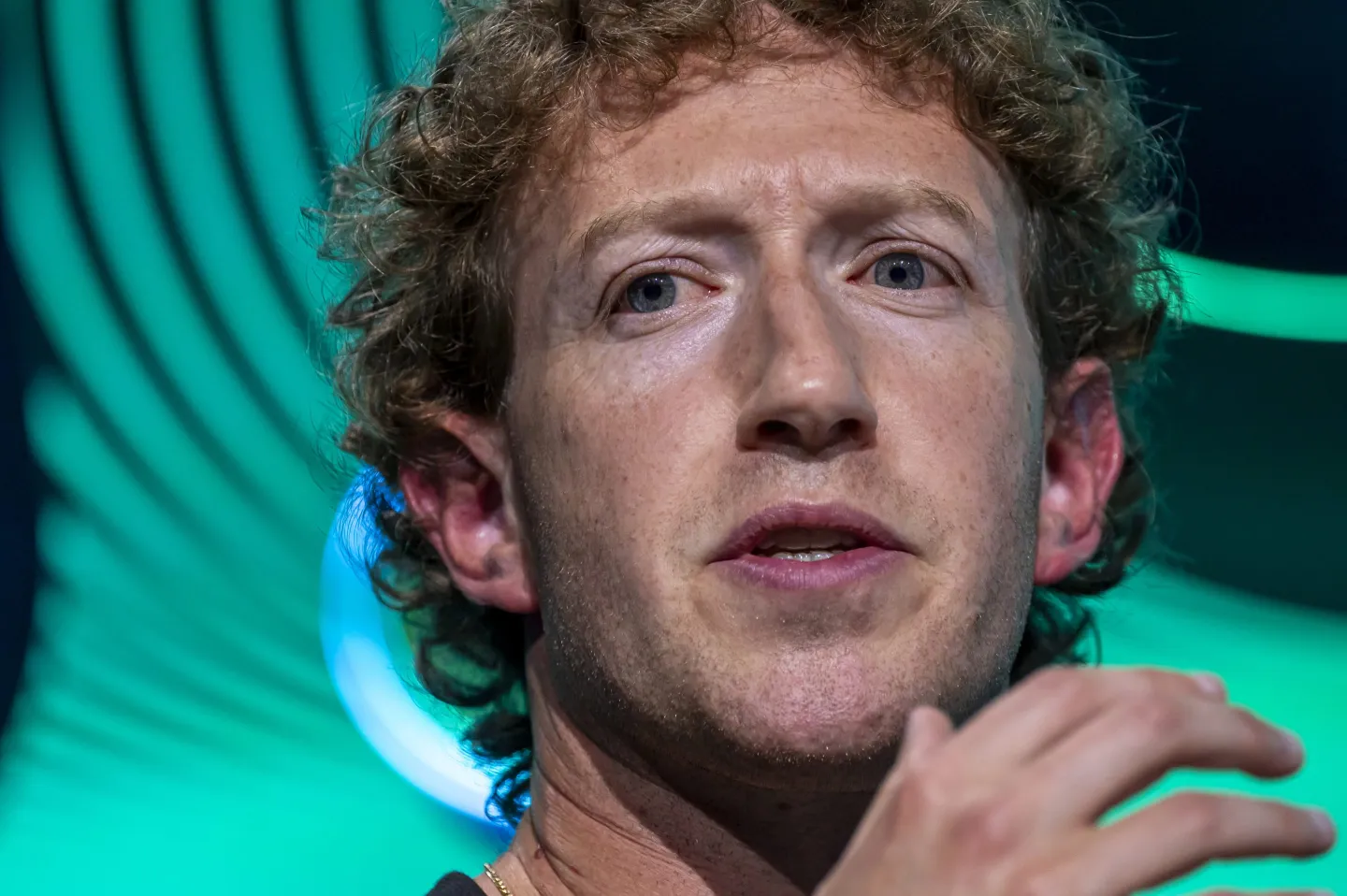Meta Shares Surge Over 5% After Crushing Q1 Earnings, Reassuring Investors on AI, Ad Business, and Macro Outlook

MENLO PARK, California (WE) — Meta Platforms Inc. (NASDAQ: META) shares jumped more than 5% in after-hours trading Wednesday after the company reported significantly stronger-than-expected earnings for the first quarter of 2025, fueled by robust advertising sales, improving AI integration, and steady user growth. The report eased investor concerns about a possible digital ad slowdown amid mounting global economic uncertainty.
The results were announced during the company’s earnings call, led by Mark Zuckerberg, CEO of Meta, who also took center stage at the Meta Connect 2024 event held on September 25 in Menlo Park. During the call, Zuckerberg expressed confidence in the company’s position in a challenging macroeconomic climate, highlighting Meta’s investments in artificial intelligence, digital assistants, and immersive technologies through its Reality Labs division.
“Our business is also performing very well, and I think we’re well positioned to navigate the macroeconomic uncertainty,” said Zuckerberg.
Blowout Earnings: Beating Wall Street on All Fronts
Meta reported earnings per share (EPS) of $6.43, significantly ahead of the $5.28 expected by analysts polled by LSEG. Revenue came in at $42.31 billion, topping consensus estimates of $41.40 billion, and marking a 16% year-over-year increase.
Net income rose 35% year-over-year to $16.64 billion, compared to $12.37 billion in Q1 2024. These results solidify Meta’s continued dominance in the digital advertising space even as competitors like Snap Inc. and Alphabet Inc. (Google) signal caution in the months ahead.
Meta’s advertising revenue totaled $41.39 billion, beating analyst expectations of $40.44 billion and accounting for nearly the entirety of total revenue.
Q2 Guidance and Expense Revisions
Meta provided guidance for second-quarter revenue in the range of $42.5 billion to $45.5 billion, closely aligned with Wall Street’s expectation of $44.03 billion.
The company also lowered its 2025 total expense range to $113 billion–$118 billion, down from its previous projection of $114 billion–$119 billion. However, it raised its capital expenditure (CapEx) guidance to $64 billion–$72 billion, up from $60 billion–$65 billion.
“This updated outlook reflects additional data center investments to support our artificial intelligence efforts as well as an increase in the expected cost of infrastructure hardware,” Meta noted in its earnings release.
The CapEx hike comes amid Meta’s aggressive push to become a key player in AI infrastructure, alongside rivals such as Microsoft and Amazon Web Services.
AI and Threads Drive Engagement
Zuckerberg also shared new milestones for Meta’s digital assistant, Meta AI, which now boasts nearly 1 billion monthly users. That’s a massive jump from 700 million users reported in January. On Tuesday, Meta launched a standalone Meta AI app, confirming prior reporting by CNBC.
Zuckerberg sees Meta AI as a potential revenue stream in the future through ads and premium subscriptions, but clarified the company would prioritize building the product throughout 2025 before attempting to monetize.
Meanwhile, Threads, Meta’s microblogging alternative to X (formerly Twitter), reached 350 million monthly users, up from 320 million in January. Meta announced last week that all eligible advertisers globally can now run ads on Threads. However, Chief Financial Officer Susan Li told analysts not to expect Threads ads to contribute meaningfully to revenue growth in 2025.
Daily Active Users, Reality Labs, and Regional Insights
Meta’s family of apps — which includes Facebook, Instagram, Messenger, and WhatsApp — reached 3.43 billion daily active users (DAUs) in Q1 2025, exceeding analyst forecasts of 3.39 billion. That’s also up from 3.35 billion in Q4 2024.
However, the company’s Reality Labs division, responsible for AR/VR products like the Meta Quest, continued to be a drag on profits. The division reported an operating loss of $4.21 billion, slightly better than the $4.6 billion loss analysts had expected. Reality Labs’ revenue came in at $412 million, down 6% year-over-year and below the projected $492.7 million.
Regionally, Meta’s Asia-Pacific advertising revenue came in below expectations, totaling $8.22 billion versus the $8.42 billion forecast. The miss reflects growing caution in Asian ad markets — a concern also flagged by both Google and Snap in their recent earnings reports.
“It’s still too early in the second quarter to have a more specific view of things,” said Philipp Schindler, Google’s Chief Business Officer, last week.
Read More:
- Cambodia Seeks China’s Financial Backing as Xi Visits Amid U.S. Tariff Tensions
- Trump Criticizes Fed Chairman Jerome Powell, Calls for His Exit Amid Rising Tensions Over Interest Rates and Economic Policy
- U.S. Tariffs on Chinese Goods Create Opportunities for Thai Exports and Industries
- Meta Launches Standalone AI App to Compete with ChatGPT: A Bold Move to Dominate the AI Space
Legal Pressure in the U.S. and Regulatory Warnings in Europe
While Meta’s financials dazzled, the company continues to face significant regulatory scrutiny on both sides of the Atlantic.
In the U.S., the Federal Trade Commission (FTC) is pursuing an antitrust case against Meta, alleging the company holds an illegal monopoly over personal social networking. The FTC is attempting to force Meta to divest Instagram and WhatsApp, arguing the acquisitions were made to neutralize competitive threats in a “buy-or-bury” strategy.
According to the Wall Street Journal, Zuckerberg offered to settle the case for $450 million, which the FTC rejected, countering with a $30 billion demand. Later negotiations reportedly saw Zuckerberg raise the offer to $1 billion, but the FTC remained firm at $18 billion.
Meta’s European business could also take a hit following a decision by the European Commission, which declared Meta’s no-ads subscription service for European users non-compliant with regional data privacy laws. The company warned this ruling could cause a “materially worse user experience” and a “significant impact” on revenue as early as the third quarter.
Political Ties and Controversy
Zuckerberg’s dealings with former President Donald Trump also returned to headlines recently. The Wall Street Journal reported that Meta agreed to a $25 million settlement with Trump in January over his 2021 ban from the platform following the Capitol riot.
Meta also donated $1 million to Trump’s 2017 inauguration fund, and Zuckerberg has met with Trump several times in recent months in what appears to be an effort to rebuild political ties as regulation looms.
Wall Street Reaction and Analyst Commentary
Meta’s stock surged over 4% in after-hours trading, building on a 25% gain over the past 12 months. The company’s shares, however, remain down more than 7% year-to-date, reflecting broader market jitters tied to inflation, global unrest, and the impact of AI competition.
Jefferies analyst Brent Thill noted in a pre-earnings investor note that Meta remains particularly vulnerable to advertising shifts and China-based advertisers, who contribute over 10% of the company’s ad revenue and have reportedly reduced spend in early 2025.
“We attribute weakness to Meta’s greater exposure to advertising (no cloud business for Meta) and China-based advertisers who have reportedly pulled back on ad spend,” Thill wrote.
Other analysts were more optimistic. Morgan Stanley, JPMorgan Chase, and Goldman Sachs all reiterated their buy ratings on Meta stock following the earnings call, citing strong margins, user growth, and AI innovation as long-term tailwinds.
Meta’s Workforce and Efficiency Strategy
Meta reported 76,834 employees as of March 31, 2025 — an 11% increase year-over-year. However, the company is maintaining a strict focus on productivity. In February, Meta laid off 5% of its workforce, targeting what it described as the lowest-performing segment of its employee base.
This move continues Meta’s cost-cutting strategy initiated in 2023, which saw the company lay off over 20,000 employees across multiple rounds in an effort to reallocate resources toward its AI and hardware divisions.
Looking Ahead: AI, Threads, and Revenue Diversification
Zuckerberg emphasized that Meta’s core strength remains its network effect across platforms and its scalable AI infrastructure, which are foundational to its future monetization plans.
Meta is expected to continue developing Meta AI into a full-fledged ecosystem with premium services, while Threads is positioning itself as a viable alternative to Twitter/X amid ongoing controversies surrounding that platform’s leadership under Elon Musk.
Still, risks remain. The company must balance regulatory pressures, public scrutiny, and shifting ad trends, all while navigating rising infrastructure costs due to its AI and AR/VR investments.
Meta’s first-quarter 2025 earnings paint a picture of a company that is not only weathering economic headwinds but also aggressively investing in its future. With a robust ad business, record user engagement, and a bold AI roadmap, Meta seems poised for continued growth — assuming it can outpace regulatory challenges and macroeconomic uncertainties.
Zuckerberg’s vision, for now, remains intact: to redefine how people interact with technology — whether through digital assistants, immersive virtual worlds, or AI-enhanced messaging platforms.
As investors digest this latest earnings beat, the broader market will watch closely to see whether Meta can maintain momentum in the face of competition from tech giants and regulators alike.












